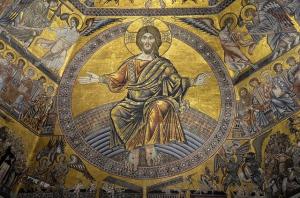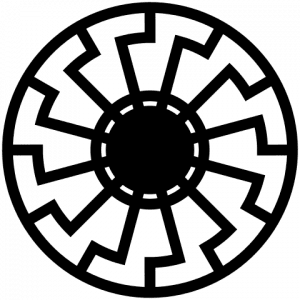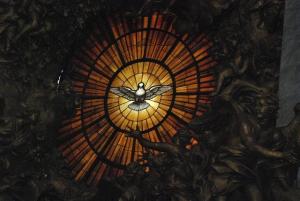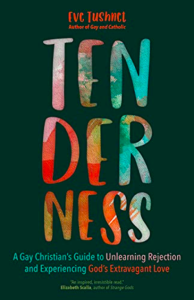Earlier posts: I Can’t Believe It’s Not Fascism, Good Country Volk, Infiltration.
Caution: this post contains examples of violent racist rhetoric and imagery.

I’ve been saying fascist ideology is incompatible with Catholicism for a while now. However, I’ve only given a basic sketch of fascist ideology so far. It may not be clear to the casual reader why fascism can’t be combined with Catholicism, in the way that political philosophies like monarchism or democracy apparently can. So let’s get into the nitty-gritty.
Nationalism
The roots of fascism lie in nationalism. In brief, nationalism is a movement that seeks to promote the interests of a people group on the basis of a shared heritage. This heritage is generally defined in terms of ethnicity, language, homeland, and history. Nationalism emerges in all sorts of contexts, usually defining itself against some backdrop that it treats as alien. Nationalism as we know it developed in late nineteenth and early twentieth centuries, and owed a good deal to the Romantic movement in poetry, music, and art. In Eastern Europe, for example, it defined itself chiefly against the empires of Germany, Austria-Hungary, Russia, and the Ottomans; countries like Poland, Yugoslavia, and Armenia asserted their autonomy for the first time in centuries after the First World War, partly thanks to nationalist sentiment. And nationalist movements sustain themselves against state suppression today, like the Kurds in southeastern Turkey, northern Iraq, and western Iran.
Now, nationalism in itself is not a bad thing. I mean, there is nothing wrong with loving and being proud of your culture, provided you don’t use it as a pretext to pretend that culture has no flaws or is inherently superior to others. However …
Ultranationalism
This is where fascism comes in. It follows the nationalist idea at the expense of everything else. At first implicitly by attitude, but presently in explicit terms, fascism does claim that the people group whose interests it promotes are intrinsically superior to these other peoples, these Untermenschen.

To be white is to be a striver, a crusader, an explorer, and a conqueror. We build, we produce, we go upward; and we recognize the central lie of American race relations. We don’t exploit other groups, we don’t gain anything from their presence: they need us, and not the other way around. Within the very blood in our veins as children of the sun lies the potential for greatness. ... We were not meant to beg for moral validation from some of the most despicable creatures to ever populate the planet. We were meant to overcome, overcome all of it, because that is natural and normal for us! The press has clearly decided to double down and wage war against … the continued existence of white America. … America was, until this past generation, a white country, designed for ourselves and our posterity. It is our creation, it is our inheritance, and it belongs to us.
Those are the words of infamous neo-Nazi Richard Spencer, speaking to the National Policy Institute shortly after the 2016 election.
The Myth of Hyperborea
Spencer’s allusion to white people being “children of the sun” is not random. Fascism, especially, the neopagan side of the movement, is fascinated with an imagined white homeland in the distant past—Thule, Hyperborea, Atlantis.1 This homeland was sometimes interpreted as being located quite literally at the north pole, the “land of the midnight sun.” This underlies a lot of fascist iconography. The swastika itself was a solar symbol long before the Nazis got ahold of it; other solar symbols, like the Celtic cross or the black sun, are popular alternatives to it among neo-Nazis who are trying not to be too obvious to normies.

The “black sun” sigil (source).
Whether they think white people are literally from Santa’s workshop or not, Spencer’s rhetoric here is standard. All intellectual, cultural, and technological accomplishment is attributed either directly to white people or to their influence. This justifies ancient empires like those of Alexander or Rome, wars like the Crusades, and, most importantly, the colonization of the Americas. The fact that these things involved wars of aggression, slavery, and genocide is quite simply irrelevant to the committed fascist. “The strong do what they can, and the weak suffer what they must.”2
Mit Brennender Sorge
No matter what ethnic group it is attached to, this flies in the face of Christianity. Pope Pius XI wrote in 1937, over the wreckage of the Concordat by which he had vainly tried to protect the Catholic Church in Germany:
Whoever exalts race, or the people, or the State, or a particular form of the State, … or any other fundamental value of the human community—however necessary and honorable be their function in worldly things—whoever raises these notions above their standard value and divinizes them to an idolatrous level, distorts and perverts an order of the world planned and created by God … This God, this Sovereign Master, has issued commandments whose value is independent of time and space, country and race. As God’s sun shines on every human face so His law knows neither privilege nor exception. … None but superficial minds could stumble into the concept of a national God, of a national religion; or attempt to lock within the frontiers of a single people, within the narrow limits of a single race, God, the Creator of the universe.

Half the New Testament is about the significance, at once historical and cosmic, of Christ uniting Jewish and Gentile believers. The Fathers used the very image of the cross, with his hands extending in opposite directions and his heart in the center, as a symbol of this reconciliation. The root doctrine of fascism is unalterably alien to the gospel. That’s plenty of reason for Catholics to resolutely oppose it, in public and in private, whatever pretexts it justifies itself with and whatever kingdoms it offers.
Further posts in this series: “The Great Replacement”
Footnotes
1Thule, sometimes Ultima Thule, is a term from ancient Greek and Roman cartography, denoting the nothernmost place they knew of. Scotland, the Orkneys, the Shetlands, Estonia, Norway, and even Iceland and Greenland have all taken “turns” as Thule, with Iceland and Norway being the most enduring candidates. Hyperborea—literally “beyond Boreas,” the north wind—was a land of giants in Greek myth, said to lie beyond Thrace (the area now occupied by northeastern Greece, Bulgaria, and the European part of Turkey), where the god of the north wind was fabled to live. Both, along with Atlantis, were used as names for the original homeland of the “Aryan race,” of which, according to the Nazis, the Germanic peoples were the purest descendants.
2This phrase comes from the Peloponnesian War. The Athenians invaded an island, Melos, which was officially neutral but aligned with Athens’ enemy Sparta. According to Thucydides, the Melians protested the injustice of the situation, and the Athenians met them with the famous cynical reply.












